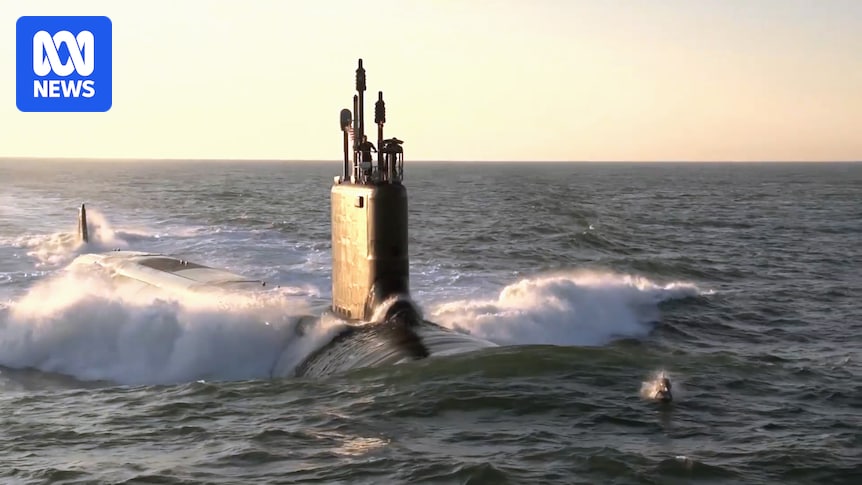A former top Pentagon official has urged Australia to give the United States more “concrete” commitments on how it would deploy Virginia-class nuclear powered submarines in the event of war, as the Defence Minister Richard Marles arrives in Washington DC for high level meetings with the Trump Administration.
Abraham Denmark — who served as senior AUKUS advisor to former US defense secretary Lloyd Austin — has penned a new report on the defence technology pact with Charles Edel, the Australia Chair for US think tank the Centre for Strategic and International Studies.
The CSIS report says AUKUS is a “strategic imperative” for the US, Australia and the United Kingdom and is now at a “critical juncture”, urging all three nations to redouble their efforts to ensure its success.
The authors back the Trump administration’s review of the defence pact, but urge it not to abandon AUKUS, saying that would make the US “less capable” in the region, warning its “defense posture and diplomatic presence would become less deeply embedded, its international credibility would be dramatically undercut (and) deterrence would be undermined” while “propaganda from Beijing and Moscow declaring the unreliability of American commitments would gain significant credibility”.
Supply of the Virginia class of submarine has been a sticking point between Australia and the US. (ADF: Bradley Darvill)
The Albanese government has been uneasy about the way some Trump administration officials have tied AUKUS to defence funding, and has pushed back forcefully against US demands that it pre-commit Virginia-class nuclear powered submarines to any American war efforts in this region.
Plan could ‘preserve Australian sovereignty’UK and Australia deepen AUKUS submarine pact with 50-year treaty
The CSIS report suggests a middle path on this “sensitive” issue, saying while Australia has every right to protect its sovereignty, the two countries should engage in robust and detailed “contingency planning” to work out how Australian nuclear powered submarines might be deployed in a conflict.
“Planning, in which military strategists from the United States and Australia would jointly undergo a comprehensive process of strategising and organising military operations to achieve specific objectives, would provide US officials with more concrete reassurances that submarines sold to Australia would not disappear if and when needed,” the report says.
“It could also preserve Australian sovereignty in developing the plan and, if necessary, in determining implementation during a crisis.”
The CSIS report lands as Mr Marles prepares to meet with US Secretary of Defense Pete Hegseth and other senior administration officials in Washington DC this week.
Australian Defence Minister and Deputy Prime Minister Richard Marles is set to meet US officials in coming days. (Reuters: Nathan Howard)
The ABC understands that Mr Marles’ might also meet with US Vice President JD Vance, although one source stressed this was not locked in.
In a statement issued on Sunday, Mr Marles said the US-Australia alliance was “built on an enduring foundation of trust”.
“I was pleased to speak with Secretary Hegseth at the Shangri La Dialogue in May, and welcome the opportunity in Washington to build on our valuable discussions of shared defence and security matters,” he said.
Australian subs base unlikely until ‘clear signal from Washington’
US Defense Secretary Pete Hegseth has previously urged Australia to increase its defence spending. (Reuters: Nathan Howard)
With the US continuing to expand its military footprint in Australia — with one eye on Beijing — the CSIS report talks up how AUKUS can help Washington DC bolster its submarine presence and maintenance from HMAS Stirling naval base in Perth.
“Most importantly for deterrence, a rotational presence from HMAS Stirling will quickly provide the United States access to an operational base for its (nuclear powered submarines) in a critical location: west of the international dateline, astride the Indian Ocean, and close to the South China Sea,” it says.
“From this location, US, UK, and eventually Australian submarines will be able to reach critical areas of potential crisis and conflict undetected, creating a far more complex and challenging operational environment for Beijing.”
The AUKUS agreement was first unveiled by Scott Morrison, former UK prime minister Boris Johnson and former US president Joe Biden in 2021. (AAP: Mick Tsikas)
The federal government has also emphasised Australia’s capacity to help maintain American nuclear powered submarines at HMAS Stirling and the CSIS report says the naval base can be “part of the solution” to America’s submarine maintenance backlog.
But the report also warns that the federal government is unlikely to invest heavily in Stirling as a major maintenance facility unless it is certain that the US will press ahead with its plan to sell three-to-five Virginia class submarines to Australia under the AUKUS “optimal pathway”.
“That construction could be significantly accelerated, but U.S. planners need to note that HMAS Stirling is unlikely to materialise as a maintenance hub for American SSNs unless and until Canberra receives a clear signal from Washington that it plans on selling submarines to them,” it says.
Edel and Denmark also warn that the efforts by Australia, the US and the UK to develop other high end military technologies under pillar II of AUKUS remain “too broad and unfocused” and argue that all three countries should instead “consider focusing on three capability areas: autonomy, long-range strike, and integrated air defense”.
Their report makes a series of other recommendations for AUKUS, including pushing for a new streamlined visa that would “facilitate the movement of researchers and industry professionals between Australia, the United Kingdom, and the United States for collaborative AUKUS-related projects.”
It also says the US and Australia should follow the lead of the United Kingdom and appoint a special representative for AUKUS who would be “responsible for driving efforts and be accountable for the success of AUKUS” and answer directly to Prime Minister Anthony Albanese and President Donald Trump.
